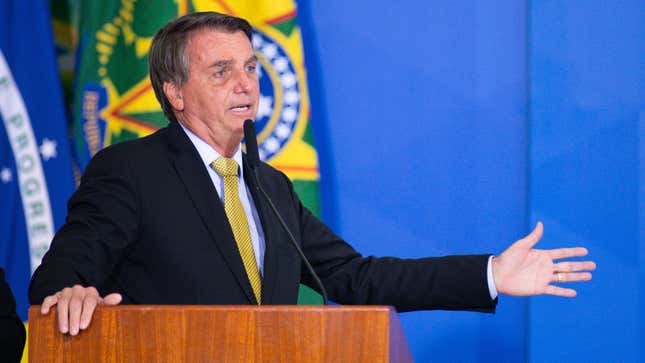
Brazilian President Jair Bolsonaro, the Meltman of fascism, is not only a global health threat thanks to his administration’s disastrous handling of the novel coronavirus pandemic, but has run into a few health issues of his own.
In 2018, when Bolsonaro was the far-right frontrunner for president, he was stabbed by a man who rushed him at a political rally. His son, Flávio, said that he arrived at the hospital “almost dead.” In December 2019, Bolsonaro was rushed to the hospital after falling and briefly losing his memory, and the next month, he said he had developed a hernia near his stab wound. Then amid a global pandemic that Bolsonaro responded to with denialism, quack treatments, mockery of medical experts, and reckless disregard for the advice of health authorities, he predictably caught the coronavirus. He shrugged it off, but while in quarantine, he somehow managed to be “bitten by a rhea, a large bird that looks like an ostrich and an emu.” Last month, the state government of São Paulo fined him for attending yet another rally without a mask. Now, after reportedly failing to shake a conspicuous cough for months, Bolsonaro has been ill for over a week with... hiccups.
The Washington Post reported Bolsonaro has now been hiccuping for over 10 days. He is now hospitalized as doctors struggle to figure out the cause. In one clip from July 8, the Post wrote, he could be heard hiccuping at least 14 times within the first minute of speaking. On Wednesday, he canceled his entire agenda, entering observation at the Armed Forces Hospital in Brasilia for a day or two.
Bolsonaro initially indicated that he had dental implant surgery earlier this month and his belief was that there could be a link between prescription medication that he took afterward and the hiccuping fit. However, Reuters and the Associated Press reported the surgeon who initially treated him after the 2018 assassination attempt has discovered Bolsonaro has an intestinal obstruction and has decided to transfer him to São Paulo for further testing to determine whether his condition requires emergency surgery.
There’s no reason to suspect the prolonged hiccuping fit could be connected to Bolsonaro’s prior coronavirus infection. Research has only rarely associated hiccuping with the coronavirus, and only during acute infections.
Mayo Clinic gastroenterologist and internist Mark V. Lawson told the Post that hiccuping for more than one day is already very unusual, Bolsonaro’s 10-day hiccup fit is incredibly so. He commented that medication could have plausibly triggered the hiccups, but that they can also be induced by a variety of physical or emotional disruptions.
The Johns Hopkins University School of Medicine tracker estimates that nearly 536,000 Brazilians have died from the coronavirus, a number that is second only to the U.S. in terms of fatalities and is almost certainly an undercount. Bolsonaro’s popularity has plummeted to record lows and Bloomberg reported on July 5 that his approval rating in a recent MDA poll by the National Transport Confederation was just 34% (other polls have pegged it as low as 24%).
In addition to widespread outrage over his administration’s handling of the pandemic, Bolsonaro’s image has taken another serious blow as authorities investigate his role in a corrupt coronavirus vaccine deal. After refusing to buy the vaccine produced by Pfizer, Bolsonaro’s administration paid the wildly inflated price of $316 million for 20 million doses of India’s Covaxin vaccine, which hadn’t completed clinical trials or received regulatory approval.